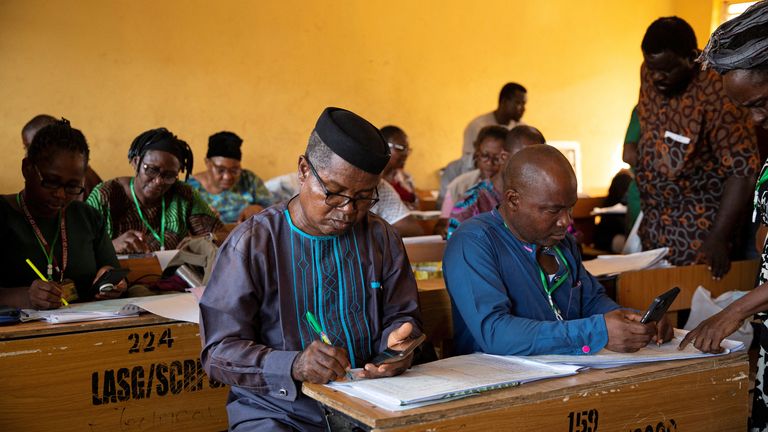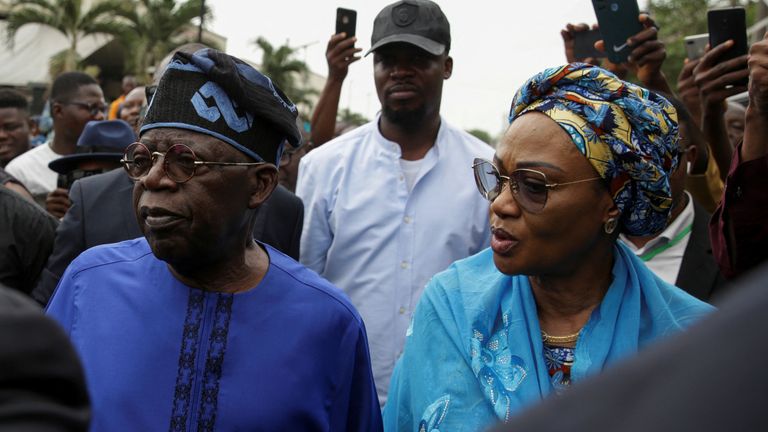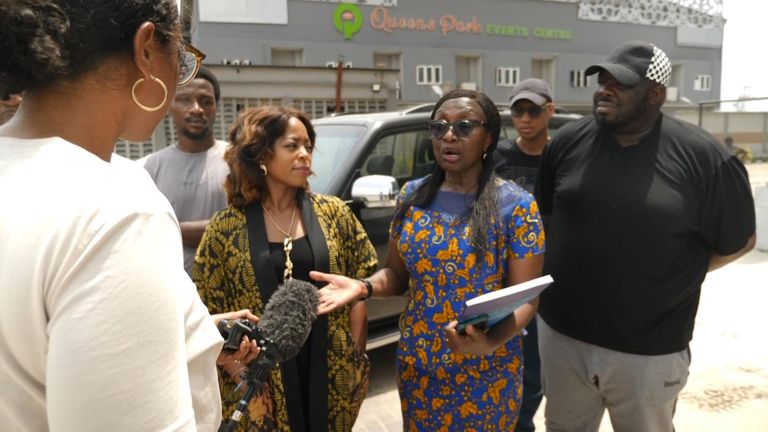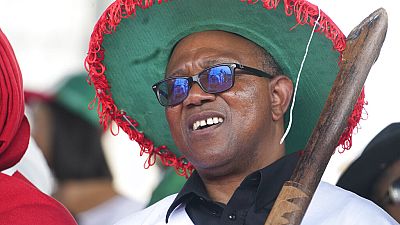Bola Ahmed Tinubu, a former governor of Lagos, has lost his home state to the 61-year-old ex-banker. Overall, the votes to determine who will be president are still being counted.
Yousra Elbagir
Africa correspondent @YousraElbagir
Monday 27 February 2023

Officials work at vote counting centre in Lagos
Votes are still being counted in the closest run presidential election in Nigeria's history.
The jury may still be out on who will be the next president of Africa's most populous country and biggest economy, but the vote is in for its economic centre, Lagos.
Bola Ahmed Tinubu, the ruling APC party's candidate and former governor of Lagos has lost his home state to 61-year-old former banker Peter Obi, who is running for the newer Labour Party.
Nigeria election: All you need to know
In what is proving to be the most exciting display of democracy in the country's political history, Mr Obi beat Mr Tinubu in Lagos State by around 10,000 individual votes.
There have been incidences of voter disenchantment and suppressions with cases of armed violence at polling stations in Lagos and across the country.

Votes are still being counted in the closest run presidential election in Nigeria's history.
The jury may still be out on who will be the next president of Africa's most populous country and biggest economy, but the vote is in for its economic centre, Lagos.
Bola Ahmed Tinubu, the ruling APC party's candidate and former governor of Lagos has lost his home state to 61-year-old former banker Peter Obi, who is running for the newer Labour Party.
Nigeria election: All you need to know
In what is proving to be the most exciting display of democracy in the country's political history, Mr Obi beat Mr Tinubu in Lagos State by around 10,000 individual votes.
There have been incidences of voter disenchantment and suppressions with cases of armed violence at polling stations in Lagos and across the country.

Peter Obi, arrives at a polling unit in his hometown in Agulu
Some polling units never arrived at their designated stations, leaving residents unable to cast their ballot.
Despite the discontent, young people who have been mobilising since the Lekki Tollgate massacre are incredibly satisfied by this result.
They see Tinubu, owner of Lekki's tollgate, as responsible for the loss of life at the #EndSars demonstration protesting against police brutality in October 2020 and have been pushing forward Mr Obi's campaign.

Some polling units never arrived at their designated stations, leaving residents unable to cast their ballot.
Despite the discontent, young people who have been mobilising since the Lekki Tollgate massacre are incredibly satisfied by this result.
They see Tinubu, owner of Lekki's tollgate, as responsible for the loss of life at the #EndSars demonstration protesting against police brutality in October 2020 and have been pushing forward Mr Obi's campaign.

Bola Ahmed Tinubu with his wife Oluremi Tinubu
21-year-old photographer and activist Bishop Duke told us that the youth have been organising over the last two years.
Nigerians under 35 make up three quarters of all newly registered voters and nearly 40% of all registered voters.
21-year-old photographer and activist Bishop Duke told us that the youth have been organising over the last two years.
Nigerians under 35 make up three quarters of all newly registered voters and nearly 40% of all registered voters.

Nigerians are yearning for new leadership
"It's a cause for celebration, because, for the longest, Lagos has been to be owned by one politician," says Bishop, referring to the "Godfather of Lagos" Mr Tinubu.
"There's definitely been a lot of rigging when it comes to Lagos for a very long time. But there was a big push and this is the genuine vote."
According to a Reuters tally of provisional results announced by electoral officials in 10 of Nigeria's 36 states at midday on Monday, Mr Tinubu leads with about 3.29 million votes, compared to 2.28 million for main opposition party candidate Atiku Abubakar and 818,000 for Mr Obi.
The winner is not expected to be announced until Tuesday at the earliest.
"It's a cause for celebration, because, for the longest, Lagos has been to be owned by one politician," says Bishop, referring to the "Godfather of Lagos" Mr Tinubu.
"There's definitely been a lot of rigging when it comes to Lagos for a very long time. But there was a big push and this is the genuine vote."
According to a Reuters tally of provisional results announced by electoral officials in 10 of Nigeria's 36 states at midday on Monday, Mr Tinubu leads with about 3.29 million votes, compared to 2.28 million for main opposition party candidate Atiku Abubakar and 818,000 for Mr Obi.
The winner is not expected to be announced until Tuesday at the earliest.
Nigeria's Peter Obi wins Lagos state

Nigeria's Labour Party's Presidential Candidate Peter Obi

Nigeria's Labour Party's Presidential Candidate Peter Obi
Copyright © africanews
Sunday Alamba/Copyright 2023
The AP. with AFP
The Nigerian presidential outsider Peter Obi has won the most votes in the key state of Lagos, narrowly beating the ruling party's candidate in his stronghold, according to provisional results released Monday by the Electoral Commission (Inec).
The economic capital of Africa's most populous country is one of the biggest vote-getters in this hotly contested presidential race between three front-runners, with state-by-state results only just being announced. Peter Obi, the Labour Party (LP) candidate, won 582,454 votes (nearly 43% of the votes cast in Lagos).
More than 87 million voters cast their ballots on Saturday to choose from 18 candidates the person who will have the tough task of turning around Nigeria for four years, plagued by a sluggish economy, recurrent violence by armed groups and bandits, and widespread impoverishment of the population.
The bustling economic capital has the largest number of registered voters in the country, more than seven million, and is the stronghold of APC candidate Bola Tinubu, 70, whom he governed from 1999 to 2007.
With 46% of the vote in Lagos, according to the provisional results of the National Electoral Commission (Inec), Mr. Obi has a narrow lead of less than 10,000 votes over his main opponent.
The "godfather", as Tinubu is known because of his political influence, admitted defeat in a statement, calling for calm after violence broke out in Lagos on Monday: "Sometimes you win, sometimes you lose. We must allow the process to continue unhindered in the country.
For Mr Obi, "this is an important victory, because Tinubu is at home in Lagos, he is considered the owner," commented Idayat Hassan, director of the Centre for Democracy and Development (CDD) in Abuja. "The 2023 election is redefining the political machine in Nigeria," she said.
The Labour Party (LP) candidate, who is very popular with a section of the youth, has managed to establish himself as a credible challenger to the two parties (APC and PDP) that have governed Nigeria for over 20 years.
And for the first time since the return to democracy in 1999, the country could experience a two-round presidential election.
- Community voting -
This election is crucial: Nigeria - with 216 million inhabitants - is expected to become the third most populous country in the world by 2050, while West Africa is threatened by a sharp decline in democracy and the spread of jihadist violence.
The continent's largest economy has become a global cultural powerhouse, thanks in particular to Afrobeats, a musical genre that is setting the world alight with stars like Burna Boy.
But faced with immense daily hardship, compounded by recent shortages, many Nigerians are calling for "change", disgusted by decades of poor governance and an ageing elite with a reputation for corruption.
For Obi, a 61-year-old Christian former governor of Anambra in the southeast, the game is far from over. Especially in the densely populated north of the country, where turnout is traditionally higher and both Bola Tinubu and PDP candidate Atiku Abubakar, a Muslim, have a large base.
The community vote is important in Nigeria, which has more than 250 ethnic groups, polarised between a predominantly Muslim north and a predominantly Christian south.
However, to be elected in the first round, the winner must obtain, in addition to a majority of the votes cast, at least 25% of the votes in two-thirds of the 36 states of the federation plus the territory of Abuja. If not, a second round should be held within 21 days.
The announcement of the full results will take time: as of midday Monday, the National Electoral Commission (Inec) in Abuja had given official figures for only four states: Ekiti (APC), Osun (PDP), Ondo (APC), and Kwara (APC).
- Accusations of fraud -
Saturday's vote went off peacefully, despite some security incidents and logistical hitches, which caused delays: counting sometimes went on late into the night, with many voters staying behind to "protect" their votes.
But the electoral process was complicated by the electronic transfer of results, which was tested for the first time at national level: most of the agents, who were supposed to upload the results from the 176,000 polling stations to a platform of the Inec, failed to do so.
The new system was introduced to improve the transparency of the election and restore voter confidence in a country where past elections have all been marred by accusations of fraud.
Only 30% of the results were uploaded to the Inec platform, which acknowledged "technical problems" but assured that the results were "safe" and could not be "falsified".
But already accusations of manipulation and attacks on the collection centres have been flying.
The Nigerian presidential outsider Peter Obi has won the most votes in the key state of Lagos, narrowly beating the ruling party's candidate in his stronghold, according to provisional results released Monday by the Electoral Commission (Inec).
The economic capital of Africa's most populous country is one of the biggest vote-getters in this hotly contested presidential race between three front-runners, with state-by-state results only just being announced. Peter Obi, the Labour Party (LP) candidate, won 582,454 votes (nearly 43% of the votes cast in Lagos).
More than 87 million voters cast their ballots on Saturday to choose from 18 candidates the person who will have the tough task of turning around Nigeria for four years, plagued by a sluggish economy, recurrent violence by armed groups and bandits, and widespread impoverishment of the population.
The bustling economic capital has the largest number of registered voters in the country, more than seven million, and is the stronghold of APC candidate Bola Tinubu, 70, whom he governed from 1999 to 2007.
With 46% of the vote in Lagos, according to the provisional results of the National Electoral Commission (Inec), Mr. Obi has a narrow lead of less than 10,000 votes over his main opponent.
The "godfather", as Tinubu is known because of his political influence, admitted defeat in a statement, calling for calm after violence broke out in Lagos on Monday: "Sometimes you win, sometimes you lose. We must allow the process to continue unhindered in the country.
For Mr Obi, "this is an important victory, because Tinubu is at home in Lagos, he is considered the owner," commented Idayat Hassan, director of the Centre for Democracy and Development (CDD) in Abuja. "The 2023 election is redefining the political machine in Nigeria," she said.
The Labour Party (LP) candidate, who is very popular with a section of the youth, has managed to establish himself as a credible challenger to the two parties (APC and PDP) that have governed Nigeria for over 20 years.
And for the first time since the return to democracy in 1999, the country could experience a two-round presidential election.
- Community voting -
This election is crucial: Nigeria - with 216 million inhabitants - is expected to become the third most populous country in the world by 2050, while West Africa is threatened by a sharp decline in democracy and the spread of jihadist violence.
The continent's largest economy has become a global cultural powerhouse, thanks in particular to Afrobeats, a musical genre that is setting the world alight with stars like Burna Boy.
But faced with immense daily hardship, compounded by recent shortages, many Nigerians are calling for "change", disgusted by decades of poor governance and an ageing elite with a reputation for corruption.
For Obi, a 61-year-old Christian former governor of Anambra in the southeast, the game is far from over. Especially in the densely populated north of the country, where turnout is traditionally higher and both Bola Tinubu and PDP candidate Atiku Abubakar, a Muslim, have a large base.
The community vote is important in Nigeria, which has more than 250 ethnic groups, polarised between a predominantly Muslim north and a predominantly Christian south.
However, to be elected in the first round, the winner must obtain, in addition to a majority of the votes cast, at least 25% of the votes in two-thirds of the 36 states of the federation plus the territory of Abuja. If not, a second round should be held within 21 days.
The announcement of the full results will take time: as of midday Monday, the National Electoral Commission (Inec) in Abuja had given official figures for only four states: Ekiti (APC), Osun (PDP), Ondo (APC), and Kwara (APC).
- Accusations of fraud -
Saturday's vote went off peacefully, despite some security incidents and logistical hitches, which caused delays: counting sometimes went on late into the night, with many voters staying behind to "protect" their votes.
But the electoral process was complicated by the electronic transfer of results, which was tested for the first time at national level: most of the agents, who were supposed to upload the results from the 176,000 polling stations to a platform of the Inec, failed to do so.
The new system was introduced to improve the transparency of the election and restore voter confidence in a country where past elections have all been marred by accusations of fraud.
Only 30% of the results were uploaded to the Inec platform, which acknowledged "technical problems" but assured that the results were "safe" and could not be "falsified".
But already accusations of manipulation and attacks on the collection centres have been flying.
Nigeria election results 2023: Opposition PDP and Labour Party accuse APC and Inec
Nduka Orjinmo - BBC News, Abuja
Mon, February 27, 2023

Dino Meleye from the opposition PDP said the electoral commission had been compromised
Opposition parties have walked out of the venue where results from Nigeria's tightly contested presidential elections are being announced.
The main opposition Peoples Democratic Party (PDP) and the Labour Party have claimed there is a lack of transparency with the new electronic voter system.
This is the first national election where an electronic device has been used to accredit voters.
The election commission has denied the opposition parties' complaints.
Inec chairman Mahmood Yakubu said the announcement of results would continue.
The PDP representative at the election centre in Abuja described the process as fraudulent, while the Labour Party asked for the announcements to be suspended or for the election to be cancelled and rerun.
However, the ruling All Progressives Congress (APC), whose candidate Bola Tinubu has established an early lead from results announced so far, said those dissatisfied with the results should go to court, and that the parties should first let the process run its course.
Live coverage as the results come in
Full results of the presidential and parliamentary elections
Why the Labour Party was not on some ballot papers
With about a third of the 36 states officially declared, Mr Tinubu has a strong lead over Mr Abubakar, with Mr Obi in third place. Most of those states are from the south-west - Mr Tinubu's stronghold - so it is still too early to predict who will win.
The ruling All Progressives Congress (APC) and the PDP have dominated Nigeria since the end of military rule in 1999 but this time, Mr Obi from the previously little known Labour Party is expected to mount a strong challenge to the two-party system. He has the support of many young people, who make up a third of registered voters. There are 15 other candidates.
A candidate needs to have the most votes and a quarter of ballots cast in 25 of the 36 states plus Abuja to be declared the winner.
Otherwise, there will be a run-off within 21 days - a first in Nigeria's history.
Mr Obi has caused a major upset by winning in Nigeria's biggest city, Lagos, narrowly defeating Mr Tinubu in his heartland.
Mr Tinubu is a former governor of Lagos state and hopes to use his record there as the basis of his presidential bid.
The ruling party candidate has accepted defeat in Lagos and said that as a democrat, he was bound to accept the outcome of any election.
"People have a right to vote for the candidate of their choice," he said in a statement released by his campaign team.
He also appealed for calm from his supporters after his loss, following reports of violence in parts of Lagos against traders from the Igbo community, like Mr Obi.
Mr Obi's victory in Lagos, though a major breakthrough for a third-party candidate, is not necessarily a huge surprise. The city is home to many young, educated people, as well as a large Igbo population - all groups widely seen as backing his campaign.
He has also won in his heartland eastern Enugu state.
What is the problem with electronic system?
The Independent National Electoral Commission (Inec) had assured Nigerians that the electronic voting system, known as Bvas, would enable it to transmit election results direct from polling stations to improve transparency.
However, there were complaints on Saturday from many voters that electoral officials refused to upload the results at the polling stations as they are supposed to.
Officials complained of a lack of internet in some places to upload the results, but voters have shared videos and images shared where Inec officials refused to upload the results.
Inec chairman Mr Yakubu has apologised for the inability of the commission to upload most of the results as promised, saying that a surge in traffic caused glitches.

Nigeria election graphic
ATIKU ABUBAKAR: The man who wants Nigerians to look back to go forward
PETER OBI: The frugal businessman capturing young Nigerian hearts
BOLA TINUBU: Lagos 'godfather' sets sights on conquering Nigeria
BASIC GUIDE: What you need to know about Nigeria's elections
FULL COVERAGE: Nigeria Elections 2023

Nigeria election graphic
Nduka Orjinmo - BBC News, Abuja
Mon, February 27, 2023

Dino Meleye from the opposition PDP said the electoral commission had been compromised
Opposition parties have walked out of the venue where results from Nigeria's tightly contested presidential elections are being announced.
The main opposition Peoples Democratic Party (PDP) and the Labour Party have claimed there is a lack of transparency with the new electronic voter system.
This is the first national election where an electronic device has been used to accredit voters.
The election commission has denied the opposition parties' complaints.
Inec chairman Mahmood Yakubu said the announcement of results would continue.
The PDP representative at the election centre in Abuja described the process as fraudulent, while the Labour Party asked for the announcements to be suspended or for the election to be cancelled and rerun.
However, the ruling All Progressives Congress (APC), whose candidate Bola Tinubu has established an early lead from results announced so far, said those dissatisfied with the results should go to court, and that the parties should first let the process run its course.
Live coverage as the results come in
Full results of the presidential and parliamentary elections
Why the Labour Party was not on some ballot papers
With about a third of the 36 states officially declared, Mr Tinubu has a strong lead over Mr Abubakar, with Mr Obi in third place. Most of those states are from the south-west - Mr Tinubu's stronghold - so it is still too early to predict who will win.
The ruling All Progressives Congress (APC) and the PDP have dominated Nigeria since the end of military rule in 1999 but this time, Mr Obi from the previously little known Labour Party is expected to mount a strong challenge to the two-party system. He has the support of many young people, who make up a third of registered voters. There are 15 other candidates.
A candidate needs to have the most votes and a quarter of ballots cast in 25 of the 36 states plus Abuja to be declared the winner.
Otherwise, there will be a run-off within 21 days - a first in Nigeria's history.
Mr Obi has caused a major upset by winning in Nigeria's biggest city, Lagos, narrowly defeating Mr Tinubu in his heartland.
Mr Tinubu is a former governor of Lagos state and hopes to use his record there as the basis of his presidential bid.
The ruling party candidate has accepted defeat in Lagos and said that as a democrat, he was bound to accept the outcome of any election.
"People have a right to vote for the candidate of their choice," he said in a statement released by his campaign team.
He also appealed for calm from his supporters after his loss, following reports of violence in parts of Lagos against traders from the Igbo community, like Mr Obi.
Mr Obi's victory in Lagos, though a major breakthrough for a third-party candidate, is not necessarily a huge surprise. The city is home to many young, educated people, as well as a large Igbo population - all groups widely seen as backing his campaign.
He has also won in his heartland eastern Enugu state.
What is the problem with electronic system?
The Independent National Electoral Commission (Inec) had assured Nigerians that the electronic voting system, known as Bvas, would enable it to transmit election results direct from polling stations to improve transparency.
However, there were complaints on Saturday from many voters that electoral officials refused to upload the results at the polling stations as they are supposed to.
Officials complained of a lack of internet in some places to upload the results, but voters have shared videos and images shared where Inec officials refused to upload the results.
Inec chairman Mr Yakubu has apologised for the inability of the commission to upload most of the results as promised, saying that a surge in traffic caused glitches.
Nigeria election graphic
ATIKU ABUBAKAR: The man who wants Nigerians to look back to go forward
PETER OBI: The frugal businessman capturing young Nigerian hearts
BOLA TINUBU: Lagos 'godfather' sets sights on conquering Nigeria
BASIC GUIDE: What you need to know about Nigeria's elections
FULL COVERAGE: Nigeria Elections 2023
Nigeria election graphic
No comments:
Post a Comment